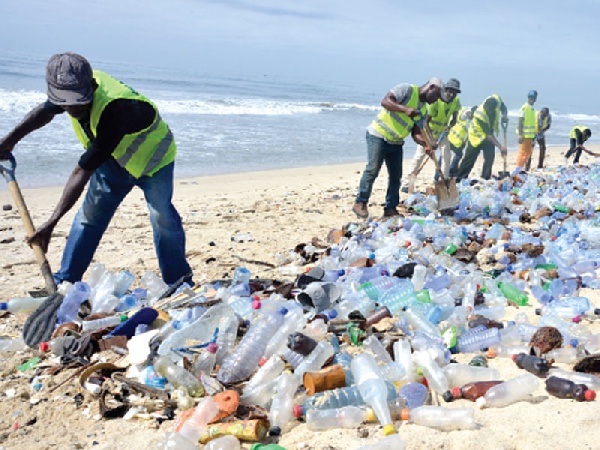The United Nations Industrial Development Organisation (UNIDO), jointly with the Ministry of Environment, Science and Technology (MEST) have launched the Ghana Circular Economy Centre (GCEC) Project initiative, towards transitioning key sectors including Plastics, Textiles and Agriculture and agro-processing to a circular economy.
The project is receiving funding from Global Affairs Canada.
A circular economy is described as a regenerative system designed to minimize waste and maximize resource utilisaion by keeping products, materials and components in use for as long as possible.
Ghana currently consumes over 1.1 million tonnes of plastic annually, most of which is used for short-lived purposes like packaging with only 19 per cent of plastic waste recovered, a study says.
The rest clogs drainage systems, pollutes water bodies, communities, with those buried under the soil taking centuries to decay as well as contributes to frequent urban flooding.
Meanwhile, plastic types such as Linear Low-Density Polyethylene (LLDPE), Low Density Polyethylene (LDPE), High Density Polyethylene (HDPE), and Polyethylene Thermoplastic Polymer (PET) hold significant economic potential if appropriate recovery methods and locally driven technologies are applied to harness their value.
The initiative is being carried out in partnership with the University of Cape Coast, Ho Technical University (HTU), Kwame Nkrumah University of Science and Technology (KNUST), and The or Foundation.
The project is anchored on four key pillars: Establishing a Centre of Excellence for Circular Economy, Providing Technical Assistance and Capacity-building for the development of circular economy technologies and enterprises, facilitating access to finance for innovative circular economy initiatives and Offering a Platform for Networking and Knowledge Exchange.
Central to the plastics value chain initiative is the University of Cape Coast (UCC), serving as the Plastics Value Chain Lead (VCL) in partnership with Cape Coast Technical University (CCTU) and City Waste Recycling (CWR) Ltd.
As part of the project activities, the team has developed a data-driven Circular Economy Opportunity Mapping (CE-OM) Report for plastics, which was validated during a national stakeholder workshop held at the Ho Technical University from July 15–16, 2025.
The project team is led by Professor Daniel Agyapong, with Dr Daniel Ofori serving as the project coordinator.
Other key members include Dr Alex Boadi Dankyi, the Project Administrator; Professor Samuel Tulashi; Professor David Teye Doku, Director of DRIC, UCC; and Dr Peterson Owusu Jnr, all from UCC. The team also includes Dr. Kwame Anane-Fenin from CCTU, Vivian Yaa Mawuli Ahiayibor and Jurgen Meinel from CWR Limited.
In a presentation of the CE-OM Report for plastics, Dr Kwame Anane-Fenin from CCTU, highlighted that building sustainable businesses in the plastic waste value chain requires more than policy
“It demands a practical, evidence-based approach that identifies where opportunities exist, who can act, and how value can be recovered across the entire plastics value chain,” Anane-Fenin said.
Dr Daniel Ofori, Project Coordinator, said: “The validation workshop is a critical milestone.”
The launching brought together experts, entrepreneurs, policymakers, youth and civil society actors to reflect on data-driven opportunities and shape a roadmap that will guide Ghana’s plastics circular economy transition.
While plastics remain unavoidable in certain sectors, particularly where product preservation demands plastic-based packaging, there is still room to minimise their use by exploring viable, environmentally friendly alternatives.
For the plastics that are produced, we must build innovative value chain systems driven by product recovery, reuse, and recycling approaches as a circular solution for the increasing plastic waste levels,” Dr Ofori said.
Joseph Yeboah, Strategic Partnerships and Engagement Lead, UNIDO, said Circular economy solutions hold strong potential to catalyze Ghana’s inclusive growth, unlock investment opportunities and create jobs.
He said the five-year GCEC project would accelerate the country’s shift from linear to circular economy, uncover waste hotspots and value leakage as well as identify bankable and scalable circular opportunities that would support the youth, women and informal sectors with entrepreneurial skills.
Prof Christopher Mensah, Pro Vice-Chancellor of HTU said the GCEC project is a multi-stakeholder initiative, with Ho Technical University (HTU) being the Host institution, is expected to drive inclusive economic prosperity, particularly for women and youth, through circular economy solutions with its success depending on proactive, inclusive, and sustained stakeholder engagement.
He emphasised the importance of national and local ownership and assured all stakeholders that HTU will fully deliver on its mandate and responsibilities.
According to the project brief, the initiative is expected to: Validate 200 circular technologies and business models, Train 2,000 small-scale entrepreneurs, Mobilise $10 million in private capital for circular economy ventures, deliver a national roadmap for plastics circularity and contribute to Ghana’s Nationally Determined Contributions (NDCs) under the Paris Agreement.
The validation workshop confirmed strong stakeholder support for the Ghana Circular Economy Centre Project’s focus on transforming the plastic value chain.
Key recommendations include investing in decentralised plastic aggregation hubs, particularly in underserved communities, to improve collection efficiency and create local jobs.
It recommended the enforcement of product standards, government uptake of locally made plastics from recycled plastics and eco-design principles to make recycling more effective.
The launch highlighted the importance of multi-stakeholder collaboration, public awareness, and financial incentives to drive uptake to build a resilient, inclusive, and economically viable plastics circular economy.
